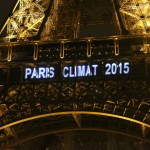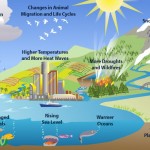Henri Landes on environmental issues in France and COP21
The Road to COP21 – an interview with Henri Landes
Henri Landes is an Energy and Climate Policy Advisor for the President of the Assemblée nationale and pretty involved in environmental issues in France and the organisation of Cop21. This week we let him share his thoughts.

What do you think are the most important environmental issues – short term and long term – that should be focused on at the next COP21?
The COP21 is unique because it will cover environmental issues more broadly at an international level and it will involve unprecedented mass movements. In terms of short-term goals, we need to ideally look into country protocols and their greenhouse gas emissions. Since the MRV (measuring, reporting and verification) tool is difficult to read and not that effective on specifying who is emitting what and how, each country needs to get on the same basis.
This means having the same targets and transparency with measuring emissions per country and per sector. Therefore, one goal should be to create a carbon budget to track and ensure that ethical production within developing countries and to help high-emission countries reduce their emissions. There is also a big long term issue with finance and the future of developing countries. The Green Climate Fund is empty today, therefore, big decisions have to be made about whether the Fund’s goal of 100B$ goal by 2020 should be the main source of finance, or if other mechanisms are more effective. We also should look at how developing countries build their own infrastructure. Is the process of developed countries going in, helping and leaving is truly effective? As both a short and long term goal, the COP21 needs to send the message that society is going to shift to a de-carbonized (low carbon) economy. The bottom line: we are not moving away from fossil fuels when we need to be.
Countries need to commit to reduction targets, with an ideal timeline of 2025, 2050 and 2100. If we want the Earth’s temperature to stay below 2° Celsius, we need to develop the technology to reach negative emissions by 2070-2080, including experiments with carbon-captured storage. It is thus important to form a universal accord among investors, (who need a guaranteed return on their investment) in these technologies and the mechanisms linking territories via carbon pricing. The COP21 needs to create a universal, fair and binding agreement between countries.
Have you ever been involved in environmental action, campaigning or previous debates involving climate change?
Yes, I have been involved in all three. Although I would say that the most effective form of spreading knowledge is teaching students. I co-founded the think-and-do tank CliMates with my colleagues from Sciences Po, and I was its president for a year and half. It proved to be a very rewarding and effective initiative involving collaborative research, advocacy and training. I was also involved in Youngo, an organization surrounding climate change, and with the REFEDD (Reseau Français des Etudiants pour le Développement Durable). At the moment, I work as the Energy and Climate Policy Advisor for the President of Assemblée nationale, Claude Bartolone, and my main job is to get politicians to develop effective discourse on environmental policy.
In the context of the COP21, do you think politicians are becoming more involved in environmental issues?
Generally yes. Barack Obama’s legacy depends on COP21 being a success; he has named climate change as a top priority. China has also been discussing issues they have been more hesitant about in the past, such as establishing a carbon tax, and is taking steps to tackle pollution and emissions. As for France, Francois Hollande offered to host the COP21, which could be considered risky, and took the opportunity to showcase the importance of the event. The Assemblée nationale working group sees the energy transition law as a top priority; it is supposed to jumpstart the economy towards green growth and will be exemplary for other parties attending the COP21.
Why should climate be a priority for Francois Hollande (given the current world situation: wars, extremism, failing economy…)?
Francois Hollande should make climate a priority due to its link with future social unrest and conflict. Because of climate change, developing countries will be more economically and socially affected than ever before. There are moral implications to intervene and inaction could worsen north-south relations. Hollande should also be working towards establishing energy transitions and becoming independent from Middle Eastern oil. COP21’s key for France and the EU is to help developing countries (namely sub-Saharan Africa). France’s relationship with African countries post-colonialism is a strong factor and it is France’s duty to make sure these countries are looked after. Finally, Hollande should make climate change a priority to give the French population something to look forward to! And realistically speaking, will he have a negative reaction to making it a priority? Probably not.
Do you think France is doing a good job of achieving its environmental policy goals?
Not really. The EU keeps pushing France to change nitrates in the water, and yet they are not being changed. There are also some symbolic steps backwards, for example, the 1000 cow farm that just opened this weekend (although it supposed to wait for executive order to launch). The ability for a Parisian to buy organic food and for a French person to support organic farming depends entirely on revenue and income, making it less accessible. Another area that could be improved is how the law to create and maintain biodiversity, developed by the sustainable development committee at the end of June, has now been pushed back indefinitely. Moreover, environmental development has not been mainstreamed in general public policy, as it has in some smaller countries, such as Denmark or Germany. Therefore, France has some very big issues, mainly because it is not progressive or ambitious enough.



